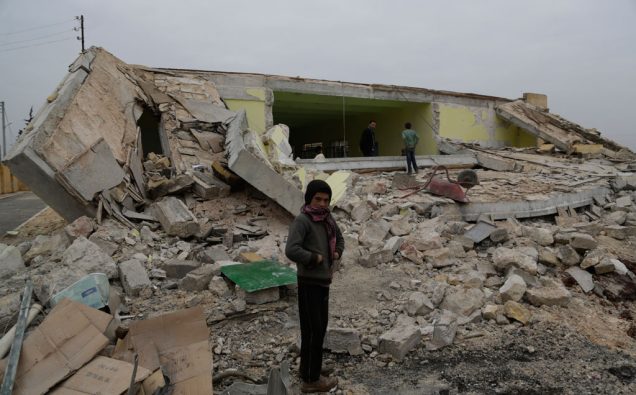
The United States, Britain and France have launched coordinated military strikes against Bashar al Assad’s regime in Syria in reaction to the use of chemical weapons against civilians.
President Donald Trump has described the actions as targeted against the regime to deter it from using chemical weapons again, and Britain has explained that these are intended to cripple the Syrian regime’s ability to do so.
However, the situation on ground is far more complex and precarious. A majority of longtime observers of the seven-year-old war believes that Assad has committed some of the worst crimes against humanity in recent history. But the international community, particularly the previous Obama Administration bears the largest responsibility for its failure to check the regime when it first crossed the Washington-set red line of unleashing chemical weapons.
Now the situation is much more different with multiple implications from any escalation. Russia has significant presence and Tehran controls a lot of things in Damascus. Both the supporters of the regime see tremendous value in strategic location of Syria in the Middle Eastern perspective. While Russia sees Syria on a larger chessboard to play, Tehran sees Syria as being close to Israel, its rival for military influence in the region.
So, what will Moscow and Tehran likely do? They would not like to give up their strategic presence in the region. While they may not go for a direct military confrontation with the U.S., which also has an important military presence there, the risk of retaliation in the form of proxies cannot be ruled out.Vladimir Putin and the Iranian regime are not likely to sit quiet for long as they believe they have really high stakes in the outcome of the war and the future of Syria.
“Given the linkage between Russia, Iran and Assad, an attack that we would consider limited and precise might be misconstrued by one or more of those three parties and justify from their perspective a retaliatory strike,” a retired U.S. Army Lt. Gen. James M. Dubik and senior fellow at the Institute for the Study of War, says according to The Washington Post.
“Then what do we do?” he adds.
That raises fears about a broader U.S entanglement, not only in Syria but across the region, already suffering from a spate of civil wars and conflicts. The possibility of a la Iraq entanglement and abyss is very real.
What is the best option for the U.S allies?
The western countries should be clear in their goals and keep the ongoing actions within a time-frame to avoid unnecessarily getting involved in yet another long drawn out and resource-draining war. Again, Afghanistan and Iraq wars have a lot of lessons to offer. The U.S. and allies must ensure that they their campaign does not kill any civilians.
"I urge all Member States to show restraint in these dangerous circumstances and to avoid any acts that could escalate the situation and worsen the suffering of the Syrian people.” #UN chief @antonioguterreshttps://t.co/VWMqIOvTeV pic.twitter.com/9cRxf1se08
— UN News (@UN_News_Centre) April 14, 2018
The UN for its part also is worried that the ongoing strikes may inflame a larger conflagration sucking in regional and major powers.
In the wake of failure of international diplomacy to resolve the Syrian conflict over the past many years, the U.S. should use the ongoing operations to force Bashar al Assad into leaving the government as he is not acceptable to a large population. His exit will pave the way for a political resolution that must take into account grievances and concerns of all segments and religious sectarian communities. Once an agreement is worked out, the UN should oversee the electoral process to minimize the possibility of rigging and ensure transparency.
Now that the ISIS or Daesh has been weakened and largely defeated, the U.S. and its allies should use this opportunity to pressure Assad into exiting the scene and allowing Syrians an opportunity to rebuild their country by reaching a UN-brokered transition to a democratic and inclusive government in Damascus.
The restoration of peace in Syria will not only serve the regional countries, it will also help major powers to ensure stability in the energy-rich and strategic region, where the Iraq war and the Syrian unrest resulted in the emergence of Daesh with repercussions for countries around the world. A political settlement, on the other hand, will serve as an antidote to extremist and violent ideologies.
A political resolution will end the long nightmare for millions of Syrians including refugees who live under the constant danger of uncertainty about their future.














